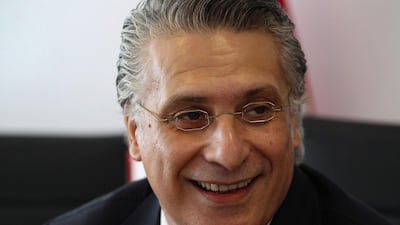A Tunis court has overruled the appeal of the imprisoned presidential candidate, TV boss Nabil Karoui, meaning he will probably remain in detention through the remaining campaigning period.
Tunisia votes in its legislative elections on Sunday, with the second round of the presidential vote between Mr Karoui and the independent Kais Saied scheduled for October 13.
News of the court decision meant staff of Mr Karoui’s party, Qalb Tounes, will have to fight two elections with their candidate in prison.
He is awaiting trial on allegations of tax evasion and money laundering from 2016 and was arrested on August 23 this year.
Samir Achour, a senior member of Qalb Tounes' political bureau, told The National that any ruling keeping Mr Karoui in prison would undermine the validity of the election result.
“Of course, that wouldn’t be a fair vote," Mr Achour said. “There’s every possibility that we would contest that.”
Mr Karoui told Arab Weekly: "I wasn't given the chance to communicate my programme and I was prevented from doing it by a court order, the timing of which was suspicious.
"It simply amounts to muzzling me and forbidding me to interact with voters.”
The Qalb Tounes team say the public absence of Mr Karoui has hurt his campaign.
While conceding that a limited number of people would have voted for him because of what they considered to be an injustice, Mr Achour said campaigns against Mr Karoui had an effect that was shown in the low voter turnout of 45 per cent.
“There was a huge campaign to discourage people from voting for Nabil because he was in jail," he said. "So these guys didn’t go and vote for someone else, they just didn’t vote.”
Prof Saied and Mr Karoui entered the presidential race as outsiders, campaigning on popular platforms that focused on the country’s poor and overlooked population.
As the results of the first ballot came in, that strategy appeared to have been successful.
Prof Saied took 18.4 per cent of the vote and Mr Karoui 15.58 per cent, ahead of much more prominent names in Tunisian politics.
Among those competing were Prime Minister Youssef Chahed and the candidate of the party that has been dominant since the 2011 uprising, the Ennahda movement's Abdelfattah Mourou.
For Tunisia, often praised as the lighthouse of the Arab uprisings, any dispute over the legitimacy of elections would cut to the very heart of its democratic transition.
For many within the Karoui campaign there is no constitutional mechanism to allow for their unique circumstances and no precedent through which to seek guidance.
And the Constitutional Court, which would typically rule in such a situation, has not yet been formed, raising the possibility of a divided public vote with questionable legitimacy.
Gossip from private pollsters suggests Prof Saied has already established a solid lead over Mr Karoui before this month's run-off.
So it is probable that his imprisonment, and what his supporters claim was a campaign of harassment leading up to last month's vote, will be revisited.
Although those rumoured polls have yet to be tested, they also suggest that Qalb Tounes is due for a convincing win on Sunday.
Under Tunisia's parliamentary rules, the majority party is eligible to nominate its candidate for prime minister, suggesting that this dramatic story may be a long way from over.

